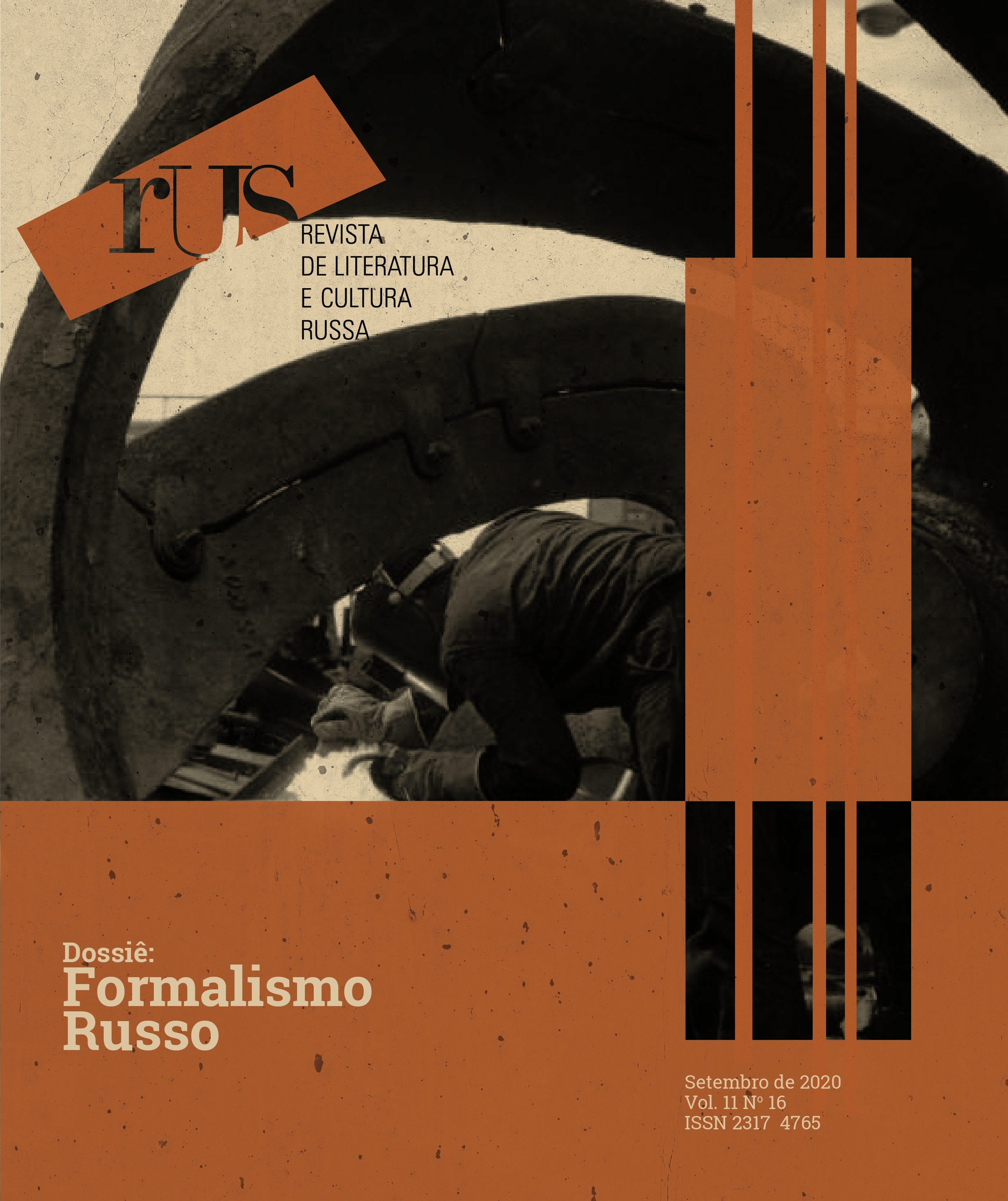Sobre as fontes de niilismo em "Crime e Castigo" de Dostoiévski
DOI:
https://doi.org/10.11606/issn.2317-4765.rus.2020.172012Palavras-chave:
Dostoevsky, Russian Radical Intelligentsia, Hegelianism in RussiaResumo
Como se sabe, Crime e Castigo, de Dostoiévski, reflete o meio intelectual do período de sua concepção. Mais especificamente, a motivação do crime de Raskólnikov está enraizada no niilismo da intelliguentsia radical do período. Neste artigo, a ideologia de Raskólnikov é identificada com a ideologia de Nikolai Tchernichévski e Dimítri Píssarev, representantes da intelliguentsia radical. Além disso, o artigo traça a continuidade e a descontinuidade das idéias destes pensadores. Por fim, argumenta que Dostoiévski percebe a evolução e a radicalização das ideias da intelliguentsia pelas lentes da evolução e radicalização dos hegelianos de esquerda, isto é, Feuerbach e Stirner, cuja ideologia influenciou a intelliguentsia radical russa. Por isso, são trazidas à tona as origens intelectuais do niilismo da intelliguentsia radical russa, seminal para Crime e Castigo, de Dostoiévski.
Downloads
Referências
ANNENKOV, P.V, The Extraordinary Decade, Literary Memoirs, tr. Irwin B. Titunik, (Ann Arbor, The University of Michigan Press, USA, 1968).
BETHEA, David and Thorstensson, Victoria, “Darwin, Dostoevsky, and Russia’s Radical Youth”, in Dostoevsky beyond Dostoevsky. Science, Religion, Philosophy, ed. Svetlana Evdokimova and Vladimir Golstein, (Academic Studies Press, Boston, 2016).
CHERNYSHEVSKY, Nikolai, “The Anthropological Principle in Philosophy”, in Selected Philosophical Essays, (Foreign Languages Publishing House, Moscow, 1953).
Chernyshevsky, Nicolai, What Is To Be Done?, tr. Michael Katz, (Cornell University Press, Ithaka and London, 1989).
DOSTOEVSKY, Fyodor, Crime and Punishment, tr. David McDuff, (Penguin, UK, 1991).
DOSTOEVKSY, Fyodor, Selected Letters of Fyodor Dostoevsky, ed. Joseph Frank and David Goldstein, tr. Andrew MacAndrew , (Rutgers University Press, New Brunswick and London, 1987).
FRANK, Joseph, Dostoevsky, vol. 4, The Miraculous Years, 1865-1871 (Princeton University Press, Princeton, 1995).
JONES, Malcolm, “Some echoes of Hegel in Dostoevsky”, The Slavonic and East European Review (vol. 49, no. 117, Oct. 1971).
JONES, Malcolm, “Raskolnikov’s Humanitarianism” in Raskolnikov and Svidrigailov, ed. Harold Bloom, (Chelsea House, USA, 2004).
Gillespie, Michael Allen, Nihilism before Nietzsche (University of Chicago Press, Chicago, 1995).
KATZ, Michael and Wagner, William, “Chernyshevsky, What is to be Done? And the Russian Intelligentsia”, in Nicolai Chernyshevsky, What Is To Be Done?, tr. Michael Katz, (Cornell University Press, Ithaka and London, 1989).
KIBALNIC, Sergei, “”If there’s no immortality of the soul,.. everything is lawful”: On the Philosophical Basis of Ivan Karamazov’s idea”, Dostoevsky Beyond Dostoevsky. Science, Religion, Philosophy Science, Religion, Philosophy, ed. Svetlana Evdokimova and Vladimir Golstein, (Academic Studies Press, Boston, USA, 2016).
LEOPOLD, David, “Introduction”, in Max Stirner, The Ego and Its Own, tr. Steven Tracy Byington, ed. David Leopold, (Cambridge University Press, UK, 1995).
PEACE, Richard, “Nihilism” in A History of Russian Thought, ed. William Leatherbarrow and Derek Offord, (Cambridge University Press, USA, 2012).
PEREIRA, N.G.O, “Challenging the principle of Authority: The polemic between Sovremennik and Russkoe Slovo, 1863-1865”, The Russian Review (vol. 34, no2, April 1975).
TOEWS, John Edward, Hegelianism. The path toward dialectical humanism, 1805-1841 (Cambridge University Press, USA, 1980).
SHIMIZU, Takayoshi, “Dostoevsky and Max Stirner”, paper given at the XIV International Dostoevsky Symposium, Naples, Italy, June 2010, Abstracts, ed. Michela Vendith.
STEPELEVICH, Lauwrence S, “Max Stirner and Ludwig Feuerbach”, Journal of the History of Ideas (vol. 39, 1975).
Stirner, Max, The Ego and Its Own, tr. Steven Tracy Byington, ed. David Leopold (Cambridge University Press, UK, 1995).
VENTURI, Franco, Roots of Revolution. A History of the Populist and Socialist Movements in Nineteenth Century Russia, tr. Francis Haskell (Weidenfeld and Nicholson, UK, 1960).
WELSH, John F, Max Stirner’s Dialectical Egoism, A New Interpretation (Lexington Books, UK, 2010).
Downloads
Publicado
Edição
Seção
Licença
Copyright (c) 2020 Markos - Galounis

Este trabalho está licenciado sob uma licença Creative Commons Attribution-NonCommercial-ShareAlike 4.0 International License.
Os autores que publicam na RUS concordam com os seguintes termos:
a. Os autores mantém os direitos autorais e concedem à revista o direito de primeira publicação, com o trabalho simultaneamente licenciado sob a Licença Creative Commons Atribuição 4.0 Internacional (CC BY-NC-SA) que permite o compartilhamento do trabalho com reconhecimento da autoria e publicação inicial nesta revista.
b. Os autores têm autorização para assumir contratos adicionais separadamente, para distribuição não-exclusiva da versão do trabalho publicada nesta revista (ex.: publicar em repositório institucional ou como capítulo de livro), com reconhecimento de autoria e publicação inicial nesta revista.
c. Os autores têm permissão e são estimulados a publicar e distribuir seu trabalho online (ex.: em repositórios institucionais ou na sua página pessoal) a qualquer ponto antes ou durante o processo editorial, já que isso pode gerar alterações produtivas, bem como aumentar o impacto e a citação do trabalho publicado (Veja O Efeito do Acesso Livre).





